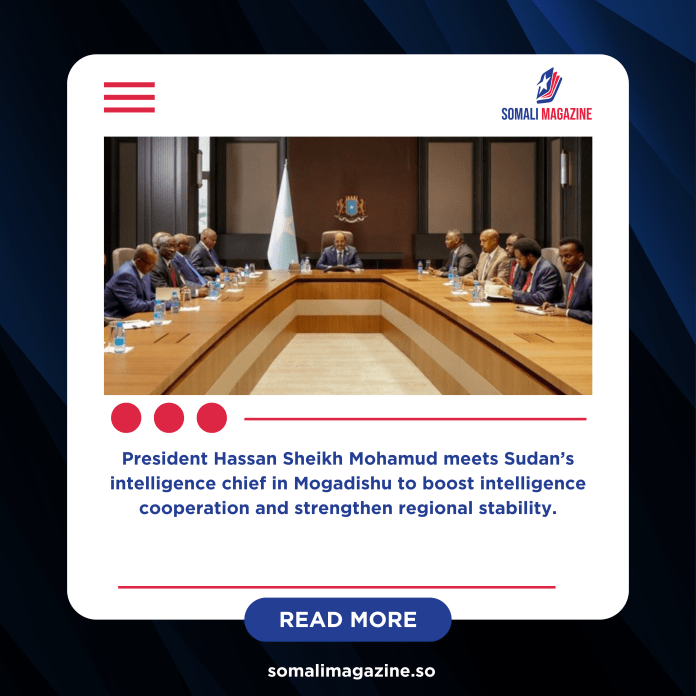Facebook Twitter (X) Instagram Somali Magazine - People's Magazine
Somalia and Sudan have taken a significant step toward boosting their security partnership following high-level talks between leaders in Mogadishu. On Wednesday, Somali President Hassan Sheikh Mohamud hosted Sudan’s intelligence chief, Maj. Gen. Ahmed Ibrahim Ali Mufadal, at the Presidential Palace to discuss ways the two countries can strengthen cooperation on security and intelligence matters.
According to Somali officials, the meeting focused on how the two nations could work more closely to address shared challenges, particularly the growing threats facing the Horn of Africa. Issues of cross-border insecurity, terrorism, and political instability in the region have created an urgent need for stronger alliances, and both Somalia and Sudan appear ready to reinforce their ties.
Maj. Gen. Mufadal, who serves as the Director General of Sudan’s National Intelligence Service, carried a message from Gen. Abdel Fattah al-Burhan, head of Sudan’s Transitional Sovereignty Council. In the message, al-Burhan reaffirmed Sudan’s commitment to deepening relations with Somalia and emphasized Khartoum’s willingness to support Mogadishu in its security efforts.
The presence of Somalia’s intelligence chief, Mahad Mohamed Salad, during the discussions highlighted the importance of the meeting. With both intelligence leaders in attendance, the talks underscored a shared recognition that regional stability can only be achieved through coordinated strategies.
For Somalia, the meeting comes at a critical time. The country has been battling Al-Shabaab militants for over a decade, and while some progress has been made, the threat remains widespread. Somalia’s government has been actively seeking partnerships with regional neighbors to strengthen intelligence sharing, improve counterterrorism operations, and block cross-border networks that provide support to extremist groups.
Sudan, on the other hand, is navigating its own set of security challenges. Since the political crisis and ongoing conflicts that erupted in the country, Khartoum has faced growing insecurity, displacement, and regional instability. These issues have not only affected Sudan internally but have also had spillover effects across the Horn of Africa. Building stronger ties with Somalia allows Sudan to cooperate on regional security issues that affect both nations.
The Horn of Africa remains one of the most volatile regions in the world, with countries like Somalia, Sudan, Ethiopia, and Eritrea grappling with armed conflicts, political transitions, and humanitarian crises. For both Somalia and Sudan, intelligence and security cooperation are seen as essential tools in confronting these challenges.
By aligning their intelligence agencies, the two countries hope to close gaps that extremists and criminal networks often exploit. Information sharing, joint strategies, and coordinated responses could help both nations not only protect their borders but also contribute to broader regional stability.
Observers note that this new momentum between Mogadishu and Khartoum fits into a wider pattern of African nations increasingly seeking homegrown solutions to their security challenges. Instead of relying solely on international partners, governments in the Horn of Africa are turning to each other to find common ground, strengthen cooperation, and pool resources.
For Somalia’s President Hassan Sheikh Mohamud, building such alliances aligns with his broader vision of creating a secure and stable nation. Since returning to office in 2022, Mohamud has emphasized regional cooperation as a cornerstone of Somalia’s foreign and security policy. Hosting Sudan’s intelligence chief in Mogadishu further demonstrates his administration’s determination to engage neighboring states in building a united front against insecurity.
Maj. Gen. Mufadal’s visit is expected to pave the way for deeper collaboration in the coming months. While no detailed agreements were announced, the tone of the meeting suggested that both governments are committed to taking concrete steps to strengthen their intelligence partnership.
In a region where instability spreads quickly across borders, Somalia and Sudan’s willingness to cooperate sends an important message. Stronger ties between their intelligence services not only enhance their own security but also contribute to peace efforts across the Horn of Africa.
As Maj. Gen. Mufadal concluded his official visit to Mogadishu, Somali officials expressed optimism that the meeting would mark the beginning of a more structured and long-term security partnership. Both governments now face the task of translating the diplomatic goodwill into practical action on the ground.
For the people of Somalia and Sudan, who have endured years of conflict, insecurity, and political unrest, such cooperation offers hope that closer ties between governments can bring about greater safety, stability, and development in the years ahead.

